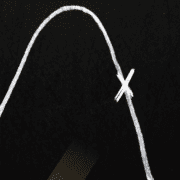The Precise Definition of Inflation
Communicating about money and finance in today’s culture is a real challenge; you want to inform and enlighten your audience on their level of knowledge—but this makes the use of terms extremely difficult. Ayn Rand Institute President Yaron Brook’s video about deflation demonstrates why.
In the video clip, Dr. Brook makes two key points. First, there is nothing bad about rising productivity and the consequence of falling prices. Second, there are no big credit collapses in a free market. I agree. These are important ideas that people need to hear, especially those receptive to free markets.
However, I have a concern regarding the word deflation.
The Root of the Problem
When it comes to this type of communication—a presentation about a specific concept—clear thinking and precise language are essential. Using one word to describe both rising productivity in a free market and defaulting bad credit in a mixed economy does not advance our understanding of monetary science. Ayn Rand called this a package deal, which is basically taking two dissimilar things that have a superficial similarity and putting them into the same word.
Similarly, people often use the term inflation to mean rising prices, and then hold this up as the worst problem of the dollar system. Rising prices is not the main flaw with the dollar (it isn’t even in the top five list).
The root problem with the dollar is that it is irredeemable. It’s a promise to pay—a debt instrument—that can never be called, and will never be honored. Dollar-denominated debt can never be extinguished. Using a debt instrument to pay off a debt merely transfers the debt.
The Closed Loop System of Debt
Let’s suppose that John owes money to Sue. So he pays her $1,000. John is now out of debt, but the debt does not disappear. The Federal Reserve now owes Sue $1,000. Next, she deposits it in a bank. Then the bank owes her and the Federal Reserve owes the bank. The lump can be moved around under the rug, but it’s still under the rug.
Every dollar was borrowed into existence. Borrowing always comes at interest. The catch is that, like all debts, accrued interest cannot be paid off. It is necessary to borrow more to make the payment.
This is why total debt must rise exponentially. What happens when the interest cannot be paid out of income? In the current phase, the debtor must sell new bonds to pay the interest and principal due on every bond as it matures. What happens when the last and biggest bond market, the U.S. Treasury bond market, fails? We don’t want to find out.
Defining Inflation and Deflation
Taking a step back, we do not concede the definition of important concepts such as selfish to cater to a populist view. We point out that lying and stealing—which many wrongly describe as selfish—ultimately serve to destroy, not advance, one’s self-interest and are therefore selfless. Though genuine self-interest does include the desire for money, self-interest is about productiveness. Stealing is only superficially similar to being productive. Both are ostensibly undertaken to obtain money. But they are really opposites.
Similarly, the word deflation does not mean falling prices. As Dr. Brook explains in his video, there are at least two reasons why prices may fall; one is that productivity always rises in a free economy (and nothing needs to be done about rising productivity, as Dr. Brook notes). Another is when the central bank in a mixed economy forces a credit expansion, soon enough loans begin to default and credit contracts. These are two distinctly different phenomena that should not be bundled into one word.
I propose that inflation be defined as an expansion of counterfeit credit. Legitimate credit is when the saver is willing and the borrower has the means and intent to repay. If a loan is made when any of these elements is missing—which can only happen with the initiation of force or fraud—then what we have is counterfeit credit. Sooner or later, counterfeit credit always leads to defaults. I propose that the word deflation be used to denote forcible (i.e., involuntary) contraction of credit: a default.
By now, everyone should realize that the dollar is failing. Defining inflation and deflation in terms of issuance and default of bad loans makes the reason clear. Defining these terms as rising and falling prices confuses the issue.
The Creation of Credit
This raises another, related issue. In the video, Dr. Brook says: “Today, you have this massive credit contraction … these deflationary pressures where money leaves the system, the amount of money in the system is contracting because banks on systemic scale are contracting the amount of loans that they are providing…”
This conflates money and credit. Testifying before Congress, J.P. Morgan famously said, “Money is gold, and nothing else.” Obviously, gold is neither created nor destroyed in the banking system.
Banks create credit. This is why banks exist. If loan defaults are rising, then banks are unable to expand credit and instead total credit in the system is contracting. This occurs whenever new loans are less than defaulted loans, which are written off. Credit, not money, is leaving the system.
The New Gold Standard
Today, money is excluded from the system by law. The system is supposed to function on credit only. This makes it easy to confuse these different concepts and I think one could make a strong case that this confusion is deliberate.
The distinction between money and credit is not necessarily important to every discussion, but it is vitally important in a discussion of our monetary system. Credit cannot perform the job that must be done by money—to extinguish debt. Credit—especially counterfeit credit—can be created by the stroke of a pen and it can go out of existence when a debtor fails to pay for any reason.
We are fighting for nothing less than the survival of civilization. The irredeemable dollar is in the process of collapsing. If gold and silver do not begin circulating prior to the dollar’s terminal impact, we risk plunging into a new dark age. Our food production and distribution industries depend on credit, and deliver the goods just in time. A credit collapse could result in massive food shortages.
Many have tried and failed to promote the gold standard before now. There are a multitude of reasons why the gold standard has not been adopted, but the focus on prices is not a winning strategy to advance the cause of gold as money. Prices have been rising for decades. People accept this. Whether or not they are happy about it, they see no cause for alarm. We urgently need the gold standard, not because of rising prices, but because of an impending collapse of credit.
Learn more about the coming gold standard that Monetary Metals is building today!
Make sure to subscribe to our YouTube Channel to check out all our Media Appearances, Podcast Episodes and more!
Additional Resources for Earning Interest on Gold
If you’d like to learn more about how to earn interest on gold with Monetary Metals, check out the following resources:
In this paper we look at how conventional gold holdings stack up to Monetary Metals Investments, which offer a Yield on Gold, Paid in Gold®. We compare retail coins, vault storage, the popular ETF – GLD, and mining stocks against Monetary Metals’ True Gold Leases.
The Case for Gold Yield in Investment Portfolios
Adding gold to a diversified portfolio of assets reduces volatility and increases returns. But how much and what about the ongoing costs? What changes when gold pays a yield? This paper answers those questions using data going back to 1972.










Extremely lucid article. Thanks to the author.
Oops, the link to the video was omitted. It is here:
https://www.youtube.com/watch?feature=player_embedded&v=IYJQJAU-YxE#!
Hi Keith,
I have most of my 401k investment in the IAU gold etf. Will this protect me from the coming dollar collapse? What will happen to gold etf when this happens?
I live in a dangerous area and cant buy physical gold because of high risk of theft.
Thanks.
Congratulations, Mr. Weiner. You may have just written one of the most important economic blog posts ever. I have been vexed by the imprecision of language regarding inflation and deflation for many years, and I believe you’ve nailed it! Kudos to you and Dr. Brooks for igniting the seminal monetary issue of our time.
Thank you frankieboy and Dennis
Inflation is the quality of bank credit declining.
Deflation is the quality of bank credit declining.
They are the same thing, hence the total confusion. It depends on which banks’ credit you are taking as the measure.
It is analogous to saying a piece of wood is one metre long & a metre is one piece of wood long.
JR: That’s good, they are both declining credit quality–of different banks!
Yes, you can’t make an objective measure of value with a subjective measure of value. Value is given by quality, so only a standard of quality can make an objective measure of value.
Inflation of say, the stockmarket, in $ terms IS deflation of the $ in terms of stocks. The stockmarket crash in ’08 was a hyperinflationary nightmare for those who had been eyeing off that sleek yacht at the marina, based on their stock portfolio, in ’07.
Thanks Keith for this very informative article.